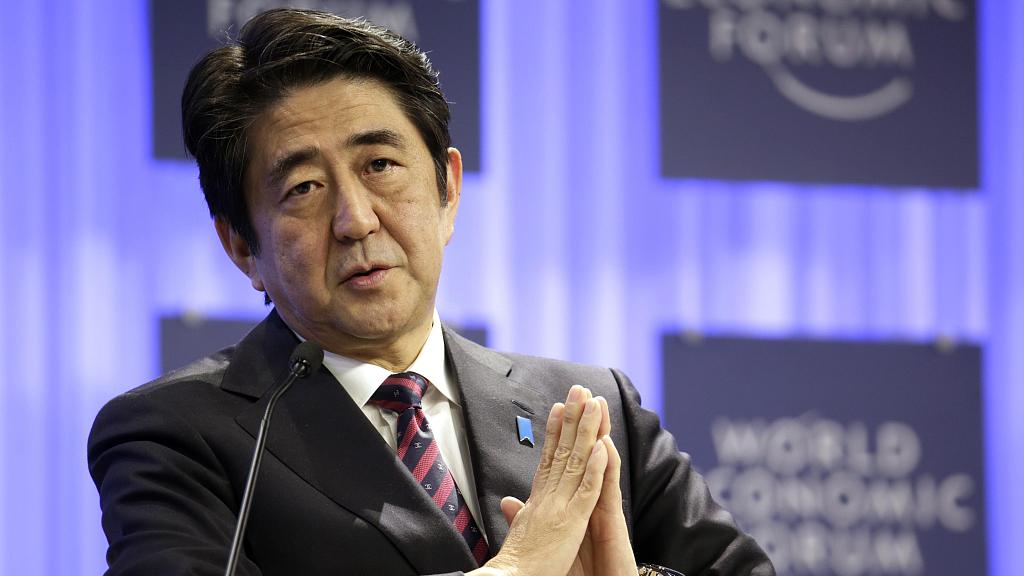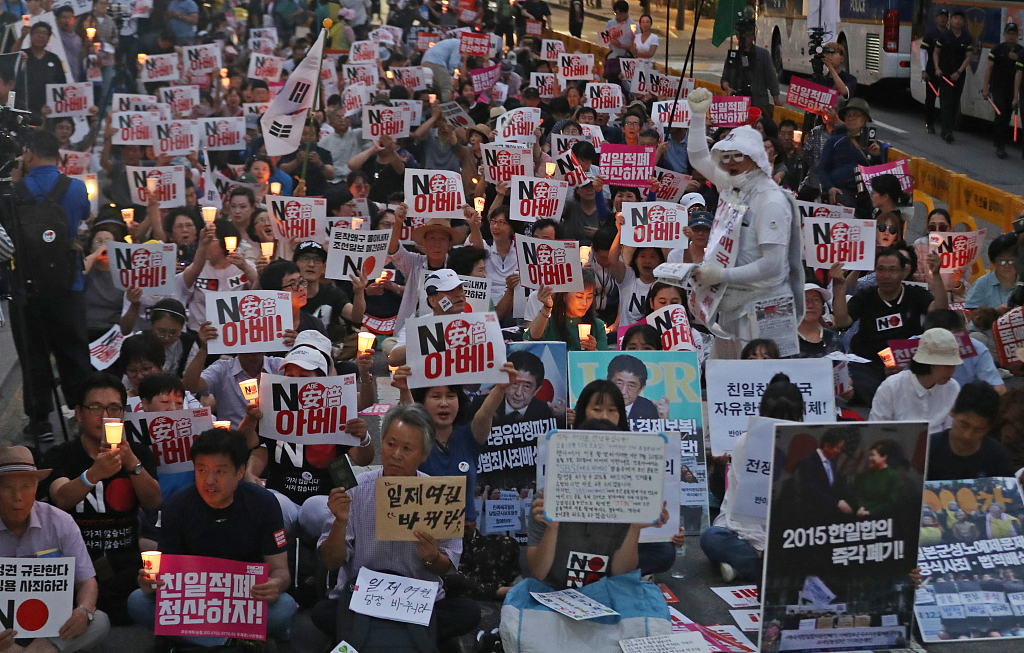
Editor's note: Xu Chuanbo is a postdoctor at Institute of Areas Studies of Peking University. The article reflects the author's opinions and not necessarily the views of CGTN.
A few days ago, Japanese Prime Minister Shinzo Abe sent a congratulatory video to China on the 70th anniversary of the founding of the People's Republic of China. Among the leaders of the world's major powers, Abe's move has set a precedent.
At the beginning of the video, Abe greeted the viewers with "hello everyone" in Chinese. He said in the video that he would like to take the occasion of the 70th anniversary of the PRC founding to extend the warm congratulations on behalf of the Japanese government and people. Abe said he firmly believes that Japan and China's joint responses to regional and global issues, as well as joint contributions to the international community are of great significance to the future of the two countries.
Abe's behavior shows his desire to advance the China-Japan relationship by congratulating China's National Day. In fact, recently, Abe has been deliberately expressing his goodwill to China. On April 16, Abe also made a rare invitation to the Chinese Ambassador to Japan, Cheng Yonghua, to have lunch with him at his official residence.
It can be said that today's Abe is the polar opposite to the one who dedicated himself tightening Japan's ties with the U.S. to contain China. So what is behind his turnaround? In fact, this is closely related to Japan's current political conundrum at home and global challenges.
On September 11, Prime Minister Abe just completed the cabinet reshuffle. On the same day, Abe said that his team would be about "stability and challenges". Such comment implies an interesting paradox. Despite support to his cabinet rising, ensuring "stability", "challenges" are lurking.

Protest against Shinzo Abe's government in Seoul, South Korea, Aug 31, 2019. /VCG Photo
Protest against Shinzo Abe's government in Seoul, South Korea, Aug 31, 2019. /VCG Photo
Domestic politics is clouded with uncertainties
Compared with the previous cabinets in Japan, Abe cabinet has been "overtime". It is reported that by November this year, Abe will become the longest-serving prime minister in Japan's constitutional history which means that the Abe's team will be enduring increasing pressure from political fractions of the Liberal Democratic Party (LDP) that covet his power.
In fact, there is already a simmering fight within the LDP where senior party members such as Shigeru Ishiba and Fumio Kishid are attempting to replace Abe. It is still unknown how long the Abe cabinet can last. The future prospect of Japanese domestic politics is full of uncertainties.
Japan-U.S. relations hit a snag
Internationally, the challenge faced by the Abe cabinet is even more daunting. The first one comes from its relationship to the United States. There has been a long-standing trade friction between the two. On September 25, Japan and the U.S. have reached an agreement under which the U.S. did not lower its tariff on Japanese cars while Japan promised to withdraw around 7.2 billion U.S. dollars in tariffs on American agricultural products. This can be described as Japan's "unconditional surrender" to the U.S. Analysts point out Japanese farmers will suffer greatly from the heavy blow of agricultural imports from the U.S., which will undoubtedly put the Abe cabinet in an extremely difficult position.
Japan-Russia relations stuck in a dilemma
The second challenge is the territorial dispute with Russia. On September 5, Japan and Russia negotiated on a peace treaty on territorial disputes and the relevant issues, but no deal was reached. Just a few hours before the negotiation, President Putin participated in the unveiling ceremony of a fishery-processing factory on the disputed Shikotan Island through a video message, to get the drop on Abe.
Japan-ROK relations remain in a standoff
The last one comes from its relationship with South Korea. The conflict between Japan and South Korea has intensified since last year when South Korea's court ordered a Japanese firm to compensate South Koreans for their forced labor during World War II. A few days ago, South Korea filed a lawsuit against Japan for illegal discharge of Fukushima nuclear wastewater at the International Atomic Energy Agency. This was a slap in the face for Japan, a country that prides itself on environmental awareness.
Generally speaking, Abe is having a rough time. He is besieged by multiple issues including domestic politics and foreign relations with the U. S., Russia, and South Korea, which have undoubtedly posed a huge challenge to his government. For Abe, the only possible political breakthrough is on its relations with China. Improved relations with China can not only strengthen his political clout domestically, but also increase his bargaining chips in Japan's negotiations with the U.S., Russia and South Korea. Therefore, it is desperate for Abe to seek improvement of Japan's relations with China.
For China, Abe's turnaround is obviously conducive to promoting the development of China-Japan relations, especially cooperation between China and Japan in a third-party market. Actually, there are already many successful cases on this front. Currently, Chinese and Japanese companies have jointly invested in a number of engineering projects in Southeast Asia, having provided a model for deepening the bilateral economic cooperation.
If Abe is willing to further adjust his polices, he will go further on promote the win-win cooperation between Chinese and Japanese companies to a greater extent. This will not only bring great benefits to the Chinese and Japanese peoples, but also safeguard and contribute the prosperity and development of the entire region and the world at large.
(If you want to contribute and have specific expertise, please contact us at opinions@cgtn.com.)